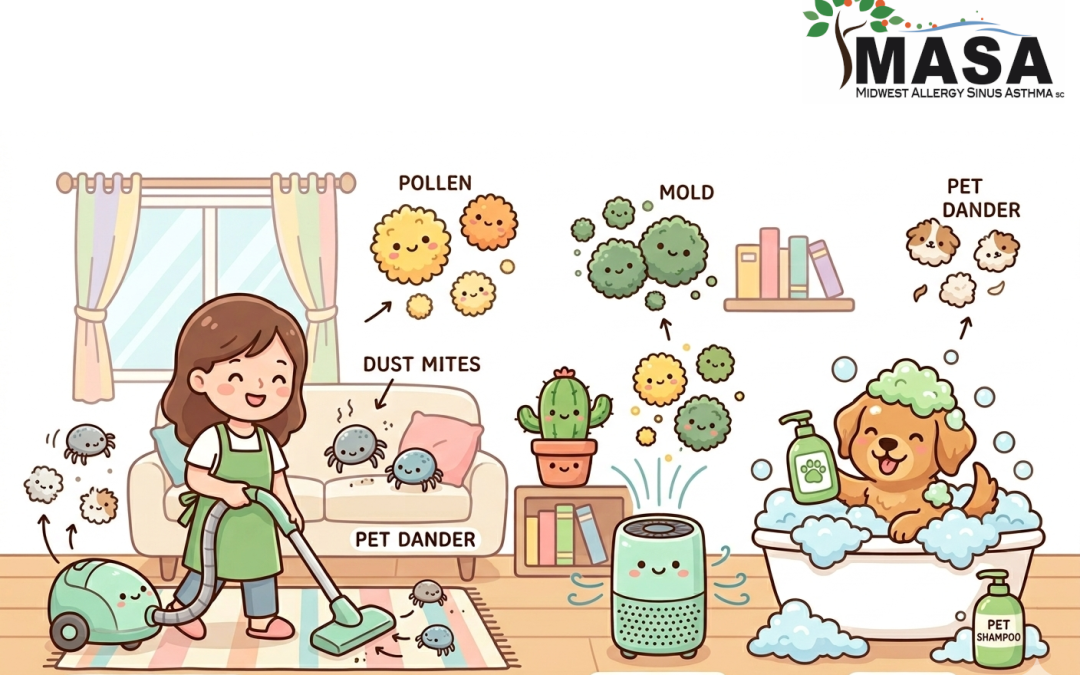Chronic Obstructive Lung Disease (COPD) Resources
Midwest Allergy Sinus Asthma, SC- Read: What is Chronic Obstructive Pulmonary Disease (COPD)?
- Listen: Dr. Crabtree explains COPD in a 7-minute interview on Springfield THE MIX
- SWIA’s Clinical Study Call for Participant (2024-2026)
Chronic Obstructive Pulmonary Disease (COPD) is a progressive lung disease characterized by persistent respiratory symptoms and airflow limitation. It encompasses two primary conditions: chronic bronchitis, which involves long-term inflammation of the airways leading to mucus production, and emphysema, which entails damage to the air sacs (alveoli) in the lungs. These conditions often coexist, contributing to the overall severity of COPD.
Key Characteristics of COPD
The main symptoms include but not limited to:
– Shortness of breath
– Frequent coughing
– Wheezing and chest tightness
– Frequent respiratory infections and fatigue
– Excess mucus production
– Occasional exacerbation of symptoms
– Cyanosis
– Frequent respiratory infections
– Lack of energy
– Unintended weight loss
– Swollen ankles/feet/leg
Causes:
The primary cause of many COPDs is long-term exposure to irritating gases and fumes, such as cigarette smoke. Other causes include:
– Long-term exposure to air pollutants, dust, and chemicals.
– Genetic factors, such as alpha-1 antitrypsin deficiency.
– Previous respiratory infections during childhood.
Diagnosis: COPD is typically diagnosed through a combination of medical history assessment, physical examination, and lung function tests like spirometry, which measures how much air can be forcibly exhaled in one second.
Management and Treatment: While there is no cure for COPD, treatments focus on managing symptoms and preventing exacerbations. Key strategies include:
– Smoking cessation, which is critical for slowing disease progression.
– Use of bronchodilators and inhaled corticosteroids to ease breathing.
– Pulmonary rehabilitation, which includes exercise training and education about the disease.
– In severe cases, surgical options like lung volume reduction surgery or lung transplants may be considered.
Early detection and Prevention: If undiagnosed or untreated, COPD can potentially cause numerous complications, such as heart problems, lung cancer, advanced respiratory infections and more. Because there is a known cause for these diseases, prevention is possible.
COPD is a significant public health concern globally, often underdiagnosed, particularly among those who smoke or have been exposed to environmental pollutants. Early detection and intervention are crucial for improving quality of life and reducing complications associated with this chronic condition.
If you or your loved ones experience persistent coughing, shortness of breath, or other symptoms of COPD, don’t wait—reach out to us at Bloomington – Normal Office: 309.452.0995 or Springfield Office: 217.717.4404. We also have satellite offices in surrounding communities. Our expert providers, including dedicated pulmonologists, are here to provide diagnosis, guidance, resources, and support. Early action can make a lasting difference.
Related Articles:

Controlling Your Environment to Reduce Allergens
🏠Controlling Your Environment to Reduce Allergens Reducing exposure to allergens like pollen, mold, dust mites, and pet dander can significantly improve symptoms and reduce the need for medication. 🐾 Animals (Pet Dander) DO AVOID Keep pets out of the bedroom and off...

WHY WINTER IS SO DIFFICULT FOR KIDS WITH ECZEMA & TIPS FOR PARENTS (The Educated Patient Interview)
Dr. Dareen Siri's interview for The Educated Patient explains why eczema, allergies and asthma are closely related, and how early, coordinated care can change a child’s long-term health trajectory. For many families, eczema is more than dry, itchy skin — it can be the...
ACADIA Study Poster
Home | SWIA Active Clinical Trials & Interest Form | ACADIA Study Poster & Factsheet Factsheet
Clinical Trial: Teen & Adult Asthma Study 2025-2026 (12-80 years old)
Do you know someone who is diagnosed with Asthma for at least 1 year and between the ages of 12-80? You may be eligible for a study and receive compensation for time and travel >> SIGN UP HERE << or contact us and our research coordinator will be in touch...





